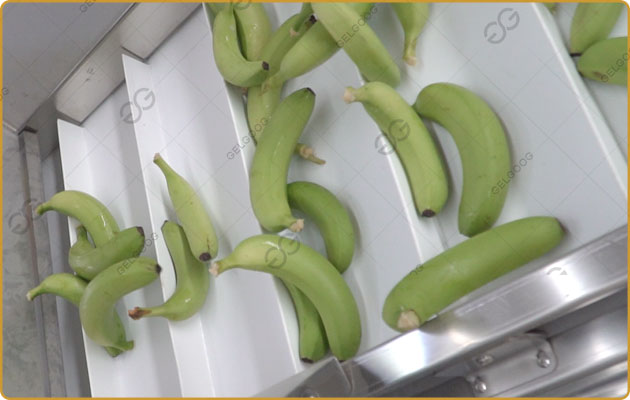Industrial processing of bananas is an important part of the modern food industry. Its core goal is to extend the shelf life and increase added value through standardized and efficient technology. The following is the complete process of bananas from picking to finished products:
- Picking and transportation
Bananas are usually picked when they are not fully ripe (green) to facilitate transportation and subsequent processing. After picking, the fruit bunches are packed into transport vehicles by mechanical or manual methods to ensure the integrity during transportation. - Cleaning and sorting
After arriving at the processing plant, the bananas are first rinsed with a cold water banana washing machine to remove surface impurities and latex, and then manually or mechanically sorted to remove rotten, deformed or unevenly sized fruits. - Peeling and slicing
Peeling is one of the key steps. Green bananas need to be soaked in 50°C hot water for 5 minutes to soften, and then peeled manually on a conveyor belt to reduce mechanical damage. After peeling, the bananas are cut into slices of uniform thickness (such as 2-3mm), and thickness control directly affects the subsequent drying effect. - Drying and sterilization
The sliced bananas need to be dried at 60°C for 8 hours to a moisture content of 4-6% to inhibit the growth of microorganisms.
At the same time, some products (such as banana powder) will be soaked in a 0.3% sodium sulfite solution for sterilization. - Processing and deep processing
Based on demand, bananas can be further processed:
Basic products: such as banana chips, jams, ice cream, etc., need to be vacuum dried or freeze-dried to retain nutrition and taste.
High value-added products: Banana peels can be crushed and fermented to produce calcium lactic acid, or fried to make banana chips.
Automated production: Modern factories use fully automatic production lines, with a production capacity of only 100-1000kg/h from slicing to packaging, achieving efficient production.

- Packaging and quality inspection
The finished products must pass strict quality inspections, including appearance, taste and microbiological indicators. The final packaging uses moisture-proof and shatter-proof materials to ensure freshness during transportation. - Diversified applications
The industrial processing of bananas is not limited to fresh fruits, but can also be made into banana beer, fruit wine, dried fruit, etc.For example, about 1.8% of India’s banana production is used to produce banana chips, and the rest is used for puree, jam, etc.